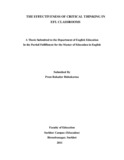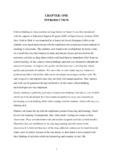Please use this identifier to cite or link to this item:
https://elibrary.tucl.edu.np/handle/123456789/535| Title: | The Effectiveness of Critical Thinking in Efl Classrooms |
| Authors: | Bishokarma, Prem Bahadur |
| Keywords: | critical thinking;class room language;learning language |
| Issue Date: | 2011 |
| Publisher: | Faculty of English Education |
| Institute Name: | Surkhet Campus, Birendranagar |
| Level: | Masters |
| Abstract: | The very research study entitled The Effectiveness of Critical Thinking in EFL Classrooms is an attempt to find out the effectiveness of critical thinking methodologies in the classrooms where English is taught as foreign language as practiced in Nepal as well as in the context of Surkhet. The researcher has primarily emphasized to learn these critical thinking skills in reading skill but as there is no any boundary between listening –speaking and reading – writing. The research was carried among the forty two students of class seven in Hermann Gmeiner Higher Secondary School, Kalagaon Surkhet. Among them there were twenty two boys and twenty girls of different ethnic groups and status. The study basically studies and analyzes the primary data collected from the Pre-test and Post-test results. It is an experimental research where the researcher has taken twenty eight classes each to Experimental Group (A) and Control Group (B). He used critical thinking methodologies to Group ‘A’ whereas he practiced other methods to Group ‘B’. The study is divided into four main chapters and other sub-topics. The first chapter is about the general introduction to critical thinking and how to enter into such thinking in English language. It further describes about the brief history from America to Nepal.The second chapter deals with the methodology adopted for the study. It includes sources of data, population of the study, sampling procedures, tools for data collection, process of data collection, limitation of the study and definition of the terms. The data collection tools are pre-test, sample test and posttest results. The third chapter is related to the analysis and interpretation of the tabulated data on the basis of the presented data.The fourth chapter consists of VIII findings and recommendations on the basis of the analysis and interpretation given in chapter three.The study found that the experimental group (Group- A) better than control group (Group- B) for developing their lower level of thinking and higher level of thinking skills after comparing the result of Pre-test and Post test results. They were instituted skilled in debate, discussion, analyze, summarize and evaluate the ideas and objects. It was seen in case of comparing boys and girls in both groups. Teaching with critical thinking skills was resulted that they are not only child friendly and democratic but also mind friendly |
| URI: | http://elibrary.tucl.edu.np/handle/123456789/535 |
| Appears in Collections: | English Language Education |
Files in This Item:
| File | Description | Size | Format | |
|---|---|---|---|---|
| cover.pdf | 116.59 kB | Adobe PDF |  View/Open | |
| CHAPTER.pdf | 507.98 kB | Adobe PDF |  View/Open |
Items in DSpace are protected by copyright, with all rights reserved, unless otherwise indicated.
